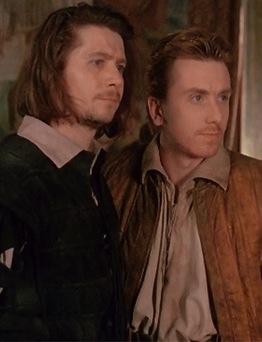Friday, April 12, 1991.
ROSENCRANTZ AND GUILDENSTERN ARE DEAD. Music by Stanley Meyers. Written and directed by Tom Stoppard, based on his 1966 stage play. Running time: 117 minutes. Rated Mature with the B.C. Classifier's warning: occasional nudity.
"ARE YOU FAMILIAR WITH this play?" a bearded Tragedian (Richard Dreyfuss) asks us.
Together with Rosencrantz (Gary Oldman) and Guildenstern (Tim Roth), we have just seen the last scene of Hamlet presented in mime by the Tragedian and his troupe of itinerant actors.
It's the scene in which Hamlet, Gertrude, Claudius and Laertes are added to the drama's body count, a fatality list that already includes Ophelia and Polonius.
It's also the part of the play that occurs after R. and G. make their own final exits.
G.'s answer, of course, is "no."
"A slaughterhouse," says the Tragedian. "Eight corpses in all."
"Six," says G. He's been paying attention.
"Eight!" repeats the Tragedian who is, after all, rather more familiar with the math of tragedy.
Are you familiar with the play?
Tom Stoppard's arch, inventive Rosencrantz and Guildenstern Are Dead assumes our complete familiarity with The Tragedy of Hamlet, Prince of Denmark (William Shakespeare's version, not Franco Zeffirelli's).
First performed by Oxford students in 1966, playwright Stoppard's idiosyncratic exercise in literary legerdemain takes place within the Bard's text. It opens with the two minor characters slouching towards Elsinore.
"There was a messenger," says Rosencrantz (or is it Guildenstern?). "We are sent for."
In keeping with traditional theatrical absurdism, Stoppard examines the meaning of life from the periphery. While awaiting their assigned encounters with the melancholy Dane, they argue the purpose of (to paraphrase Macbeth) poor players that strut and fret their hour upon the stage, then are heard no more.
Inspired as much by the patter routines of Gilbert and Sullivan (or Danny Kaye) as by Lit. Crit. 301, Stoppard's original play indulged in the glib, common-room style of humour that was taken to television in 1969 by the Cambridge-educated members of Monty Python's Flying Circus.
For all of their gloom, R. and G. are comedians who play off one another with skill and impressive timing. In adapting his play for the screen, Stoppard takes advantage of the surreal possibilities available to moving pictures.
A first-time director, he draws upon lessons learned producing screenplays for the likes of Steven Spielberg (Empire of the Sun) and Terry Gilliam (Brazil). In the process, he offers a lively time to all off-the-wall intellectuals already familiar with the play.
The above is a restored version of a Province review by Michael Walsh originally published in 1991. For additional information on this archived material, please visit my FAQ.
Afterword: The Brits took notice of him early on. A young Gary Oldman's showy stage work in London's West End resulted in writer/director Mike Leigh casting him opposite Tim Roth in the 1984 kitchen-sink comedy Meantime. On his own side of the Atlantic, Oldman was the sort of actor who played complex heroes, a selection of starring roles that included punk rocker Sid Vicious (in Alex Cox's 1986 musical biography Sid and Nancy), playwright Joe Orton (in Stephen Frears's Prick Up Your Ears; 1987), and composer Ludwig van Beethoven (in Bernard Rose's Immortal Beloved; 1994). In the U.S., what they noticed was his talent for outsized villainy, the sort of character who menaced a preteen Natalie Portman in Luc Besson's Leon: The Professional (1994). Oldman's early Hollywood career includes such tortured bad guys as Lee Harvey Oswald (in Oliver Stone's JFK; 1991) and the title role in Francis Ford Coppola's feature, Bram Stoker's Dracula (1992). The sort of actor who enjoyed living large — four marriages followed by four divorces; alcoholism followed by AA membership — he's become less bravura in his acting choices. Oldman's recent work includes playing sympathetic supporting characters in such big screen franchises as the Harry Potter pictures (appearances as Sirius Black in 2004, 2005, 2007 and 2011) and the Batman series (as James Gordon in 2005, 2008 and 2012). Gary Oldman turns 58 today (March 21).
